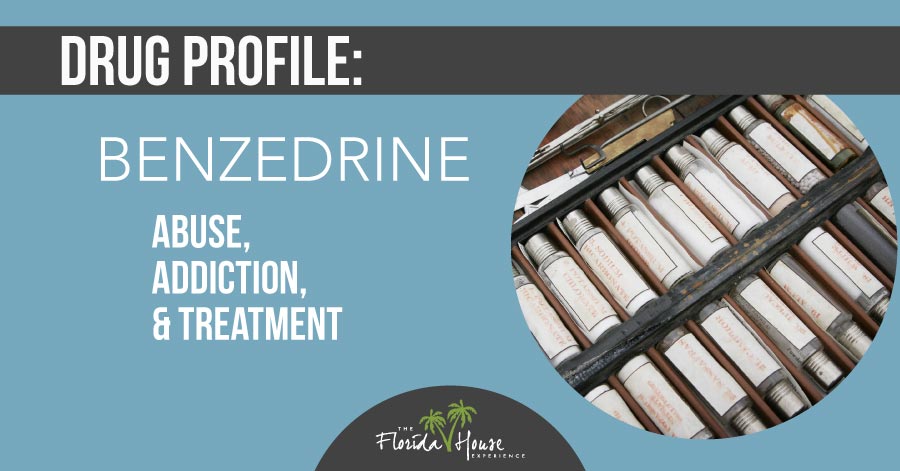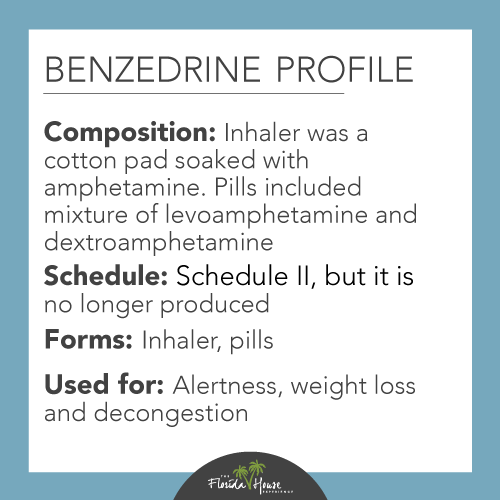
Updated 12/23/2024
Benzedrine is a type of amphetamine that was a prescription drug used as a decongestant as early as 1932. Often used as an inhalant, Benzedrine works well to clear the nasal passageways. At first, no one recognized the high risk of addiction that came with the use of this drug. Made popular for many reasons, including famous users such as the writer Jack Kerouac, this stimulant is not readily available today.
What Is Benzedrine? A Look at the History of Amphetamines
 In 1932, Smith, Kline & French sold an inhaler much like those used today for asthma care except that instead of a pressurized canister to dispense the medication, the Benzedrine inhaler contained a strip of cotton soaked with an amphetamine oil. The company called the product Benzedrine, and people didn’t require a prescription to obtain it.
In 1932, Smith, Kline & French sold an inhaler much like those used today for asthma care except that instead of a pressurized canister to dispense the medication, the Benzedrine inhaler contained a strip of cotton soaked with an amphetamine oil. The company called the product Benzedrine, and people didn’t require a prescription to obtain it.
People who started using it for the treatment of nasal decongestion quickly discovered the stimulant effect of the drug. They would take apart the inhaler, access the drug and smoke or inject it. Some even ate it.
Over the next few years, the drug was marketed for a variety of other things. For example, Benzedrine salts were formed into pills and used to aid in weight loss, sleep improvement or as a treatment for depression.
Perhaps the most interesting use of the drug came as World War II began. At that time, a physiologist from Northwestern University suggested to the Office of Science Research and Development that the agency test the drug as a way of helping to keep people alert and awake. It provided a quick fix to keep people awake longer. Even at this point, it was evident the drug was habit-forming, but having just suffered the Pearl Harbor attack, the government decided it was okay to prescribe.
According to Smithsonian.com, countries such as Germany and England used Benzedrine or another form of the drug. It worked to keep people awake and ready to fight, even if they couldn’t sleep for long periods of time.
When the war ended, 16 million Americans had been exposed to Benzedrine tablets, which helped to normalize the use of amphetamine sulfates. American soldiers used them, but so did their wives, who benefited from the weight loss impact.
Over time, the government began to recognize the risks. In 1959, the FDA cracked down on the use of Benzedrine inhalers, making them available by prescription only. Estimates found that, by 1970, 5 percent of Americans, which amounted to 9.7 million people, were using a form of prescription amphetamines, with another 3.2 million people recognized as addicted to them.
An epidemic, much like the opioid epidemic impacting the United States now, took over during these years. The passage of the Controlled Substances Act in 1970 classified the drug as Schedule III, and this classification was later increased to Schedule II.
Identifying Benzedrine
Benzedrine is no longer manufactured. However, Benzedrex, which uses another form of this drug, is still being made. Often called bennies, anti-phetamine drugs or bennys drugs, these amphetamine inhaler products are hard to locate today. Now, crosstop drugs, which are amphetamines, are a similar type of product.
What are the Signs and Effects of Abusing Benzedrine?
Short-Term Abuse of Benzedrine
In the short term, Benzedrine creates a sense of high and works as a stimulant. Some impacts include:
- Dry mouth
- Headaches
- Nausea
- Severe anxiety
- Teeth grinding
- Dizziness
- Heart palpitations
- Increased heart rate
- Rapid breathing
- Irregular heartbeat
- Erectile dysfunction
These signs of use occur as a result of the drug impacting the central nervous system. It works to excite the brain and the body’s organs, including the heart.
Long-Term Abuse of Benzedrine
Over time, damage to the brain and central nervous system occurs. These changes alter the way the brain communicates with the rest of the body, creating long-term results. Among the changes seen in long-term abuse are:
- Paranoia
- Respiratory problems
- Higher blood pressure
- Hallucinations
- Violent behavior
- Cravings that seem to intensify for the drug
- Compulsive obsession over obtaining the drug
- Loss of coordination
- Convulsions
In both short-term and long-term abuse, it is possible for a person to overdose on Benzedrine or any type of amphetamine. Signs of a potential overdose include:
- Loss of consciousness
- Psychosis — not making sense and seeming to break from reality
- Chest pain or a heart attack
- Strokes
- Irregular heartbeats leading to sudden cardiac death
Understanding Addiction to Benzedrine
Addiction to Benzedrine, or “bennies,” is much like an addiction to any type of dexamphetamine or amphetamine. The drug is highly addictive because it’s a neurological stimulant. People turn to the drug as a way to stop eating as much, to stay awake and to attain endless amounts of energy. These side effects encourage a person to continue to use the drug, even as it causes harm to the body and can create chemical dependency.
How Bennies Impact the Body and Mind
Chronic use of any of these drugs can impact the central nervous system. They can also create psychosis in some people. Chemical dependency can occur during any duration of use, though it is more common as a person uses the drug more frequently. While Benzedrine is no longer available, individuals may develop drug dependency and addictive behaviors from other forms of amphetamines.
Withdrawal Symptoms from Benzedrine
This is evident by significant withdrawal symptoms when the drug is no longer available. Individuals may feel or experience:
- Anxiety
- A sense of panic
- Nightmares
- Violent behavior
- Paranoia and confusion
- Strong cravings for the drug
- Irritability
- Suicidal thoughts
- Severe depression
Treatment for Benzedrine Abuse
Treatment for any type of amphetamine abuse requires a careful diagnosis by a therapist in a clinical setting. Most people need to go through a detox program if they are long-term users, especially if they have used a significant amount of the drug. Treatment options include both inpatient and outpatient care. Those with long-term abuse may need to be monitored in a medically approved location during the withdrawal period for safety.
Inpatient care tends to focus on diagnosis and creating a treatment plan. Co-occurring mental illness is also treated alongside this addiction. Inpatient treatment is best for those without a strong support team at home or in an unsafe environment. It can also be beneficial to those with years of drug use and those who have experienced any form of psychosis in using or withdrawing from this drug.
Outpatient programs may be effective for some people if they have a strong support team. Additionally, these should be highly motivated people who are ready to stay clean and rehabilitate from this type of drug abuse.
Treatment at FHE Health Offers Solutions
While it is not common to see someone addicted to Benzedrine, or “bennies,” amphetamines are commonly abused. At FHE Health, we provide comprehensive treatment to address amphetamine abuse with detox, inpatient and outpatient services. Contact us today.






